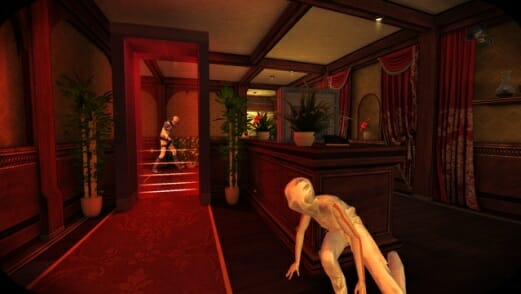République (iOS)

I backed République on Kickstarter because I believed the concept had potential. As of its first episode, though, that potential remains only somewhat fulfilled.
The initial installment of this stealth thriller, “Exordium,” serves as an introduction to the dystopian society of Metamorphosis, a kind of Rapture in miniature. The game’s conceit is clever: The player takes on the role of a hacker who taps into the facility’s omnipresent cameras to guide the story’s young heroine, Hope, on her quest to escape. Hope is about to be reprogrammed—in the Soviet sense—and with the help of a turncoat IT whiz named Cooper, you’ll help her evade capture by subverting the surveillance and security apparatus of this cult-like police state.
Playing République, you may detect echoes of early Resident Evil games. While you can adjust the viewing angle of the camera you’ve Quantum Leaped into, the environment stays static. Your challenge is to guide Hope around guards—called “Prizrak” in the game’s fiction—by manipulating the environment and using items, but mostly through stealthy movement. Your key tool is OMNI view, a kind of Detective Vision that freezes the screen in static tones.This mechanic is particularly successful because it pauses the game, allowing you to plan actions. It also highlights possible interaction points like doors, supply crates and terminals.
Theoretically, this makes for tense real-time stealth encounters, where you plot moves tactically and then watch Hope execute them, à la Frozen Synapse. It can be satisfying to sneak up behind a Prizrak, pickpocket him and skulk off without alerting him. But when isolated, enemies are usually easily stalked and/or avoided. Their cone of vision is odd as well: Sometimes they are alerted by a passing shadow, other times you can get right up next to them without a problem. And while the environments are serviceable enough for these stealth encounters, there’s a good amount of backtracking to endure—so get ready to see them again and again.
While I enjoyed leaping between cameras, République produced the same major issue I had with the Metal Gear Solid games (unsurprising, given that Camouflaj developer Ryan Payton is a veteran of Metal Gear Solid 4). Often, I felt like I was fighting the camera more than making tactical stealth decisions. Camera rotation felt somewhat slow to respond—meaning that I could plan a move, and while Hope was executing it, I couldn’t swing the view around in time to redirect her if a Prizrak approached from another angle. The difficulty could be mitigated somewhat by switching cameras in OMNI view, and the smartly-designed icons indicating whether Hope would be in cover when she moved helped. Still, the control scheme takes some getting used to.
If you collect a certain item, Cooper makes a fourth-wall-breaking jab at virtual joysticks in mobile games. The quip feels ironically unearned, given how frustrating it can be to pinpoint Hope’s desired move location, especially when objects are in the way. Similarly, it’s hard to make Hope pick up items like books, since there is no dedicated icon for “take”; often she just walks up and stands by the item.
République seems to revel in breaking the fourth wall, yet I’m not sure it succeeds very well in doing so. Among the collectibles that help flesh out the game world are game cartridges supposedly belonging to Cooper, Atari-styled carts for iOS darlings like Sword & Sworcery and Year Walk. Rather than endearing, I found this conceit incredibly distracting. A game like République succeeds on the strength of its world-building, and these mini-ads (because that’s what they are, even if they are shilling critic-approved indie games) break the fourth wall in an uninteresting, thematically-inappropriate way. Same with the multiple references to Kickstarter. Backers at the $1,000+ level had their names inserted into the fiction; at one point in my playthrough, Hope was captured by Jerry “Tycho Brahe” Holkins of Penny Arcade infamy. I can think of few people I’d rather be manhandled by less.
